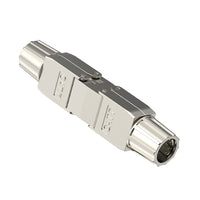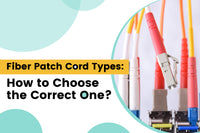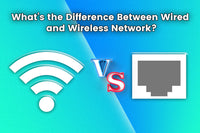Contents
As is known to all, fiber optic cables and copper cables are common communication mediums. Both of them are essential in different network cabling. Are you confused about the difference between optical fiber and copper? Optical fiber and copper have their own pros and cons. The following article will make it simple to understand for you when it comes to optical fiber versus copper.
What is Copper Wire?
Copper wire is very common in various scenarios including power generation, telecommunications, and electronics. Copper wire has a long history. It was first used in electrical applications because of the invention of the electromagnet and the telegraph.
Twisted pair cables and coaxial cables are commonly used in telecommunications. Twisted pair cables feature four copper conductors that are twisted into four pairs. There are many types of twisted pair cables including Cat5e, Cat6, Cat6a, Cat7, and Cat8. They can also be divided into shielded or unshielded twisted pair cables. Coaxial cables were the first type applied in Local Area Networks (LAN), but they have been gradually replaced by UTP cables or fiber optic cables in recent years.

What is Optical Fiber?
An optical fiber is a transparent fiber made of pure glass or plastic, which is as thick as a human’s hair. Though it is very thin, never understate the power of an optical fiber. Optical fiber is often used as a medium to transmit light over a long distance at a higher bandwidth.

Optical fiber is widely used in different areas including communication systems, networkings, and space applications. Fiber optic cable can also be divided into different types according to structures, applications, and materials.
Fiber Optic Cable vs Copper Cable
With the popularity of fiber technology in network cabling, you may be confused about whether to install fiber optic cables or copper cables. Fiber optic cables and copper cables have their own advantages and disadvantages and the main difference lies in the bandwidth, distance, speed, reliability, durability as well as installation cost.

Advantages of Fibre Optic Cable Over Copper
Bandwidth of Optical Fiber
First of all, you should understand the meaning of bandwidth. Bandwidth means the maximum amount of data that can be transmitted per second. Image it, if a road is very narrow, a vehicle has to move slowly and the road needs to be repaired regularly. The bandwidth is just like the width of the road, and greater bandwidth can help transmit data at a higher speed.
Fiber optic cables can support higher bandwidth than copper cables. Each strand can carry a lot amount of information, which is the great advantage of fiber optic cable over copper.
Fiber Optic Cable Speed and Distance
The theoretical speed of optical fiber is the light speed, and the maximum speed of fiber optic cable in practice can reach 100 Gbps, while copper cable can only reach a speed of up to 40 Gbps. In addition, copper cables are usually limited to lengths of 100 meters (330 feet) and a longer distance can degrade the signal quality. Fiber optic cables allow data transmission over a longer distance with less signal loss.
Reliability and Durability
As is known to all, due to the nature of copper, copper cables are susceptible to electromagnetic interference (EMI). And crosstalk can happen when copper wires are running. Fiber optic cable transmits data through pulses of light, so it is immune to any electromagnetic interference and resistant to outside environmental factors such as temperature and moisture.
What’s more, copper cables may be easy to break in the process of network installation as they perform badly in tension. They also need large space because of the large size. Compared to thick and heavy copper cables, fiber optic cables are a bit thinner and lighter and less prone to damage and breakage. Fiber optic cables also take up less space than copper. In general, fiber optic cables have a longer service life than copper cables.
Advantages of Copper Cable
Since the invention of Ethernet in the 1980s, copper cables have been widely used in the network for their easy installation, complete standard, and cost-effectiveness. Twisted pair cables have still been very popular today, so it’s obvious that copper cables must have their own advantages.
- Cost-effectiveness: Though the cost of fiber optic cables has decreased in recent years, installing fiber optic cables and related hardware is still more expensive than copper cable installation.
- Power over Ethernet (PoE): You have already known that the twisted pair cable transmits electrical signals, so it has the capability to provide devices with electrical power and network connection at the same time. Fiber optic cables have no such function.

Will Optical Fiber Replace Copper in the Future?
In the past years, with the rapid development of FTTH programs and mobile network upgrading programs, optic fiber cables have gradually occupied the market share of the network. And the question of whether optic fiber will replace copper in the future has become a hot topic in network cabling. What’s your opinion about this topic?
In fact, in the past years, we have witnessed rapid development and upgrading of both optical fiber and copper. Optical fiber has been widely used in the data center, while copper has still been the main medium of voice and home network transmission. Copper cables are still promising in the future for their PoE technology, wireless access, and backward compatibility. The invention of the CAT8 cable also indicates the development of copper cable, and CAT8 has a data transmission speed of up to 40 Gbps.
Optical fiber and copper will co-exist for a long time in the future. Pairing the optical fiber with copper can be the best solution for network cabling.

For more information on this topic, you can keep up on our blogs. While VCELINK offers general and basic information for our customers and other visitors to the website, it’s not professional advice.






Handles massive data transmission with minimal signal loss, ideal for high-speed networks and future upgrades. I appreciate the insights you provided in your blog. Thank you for sharing this valuable information.